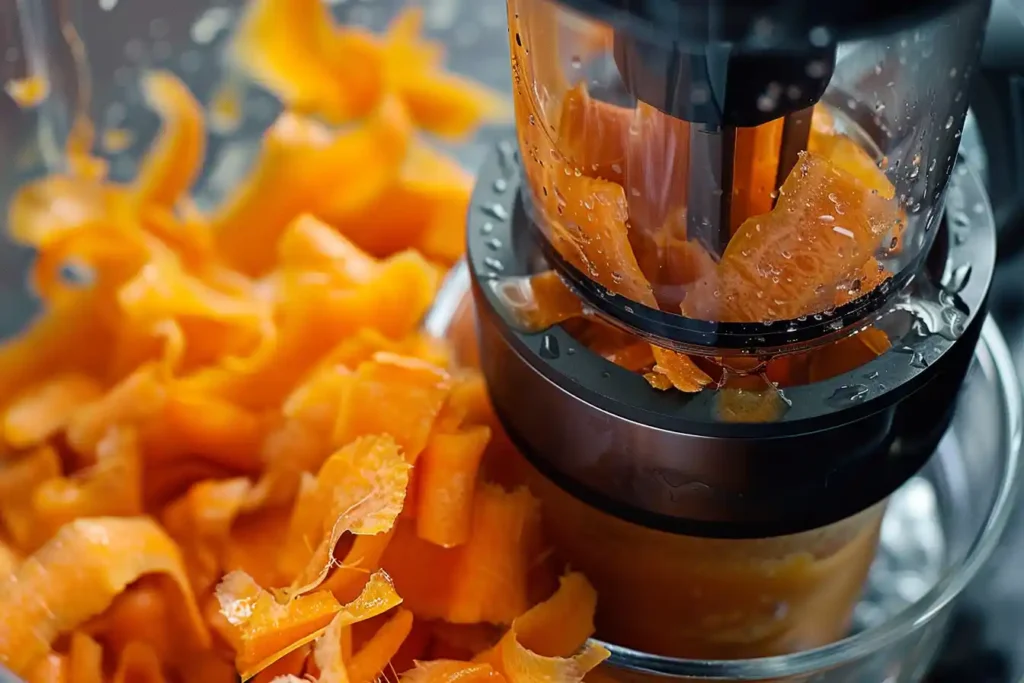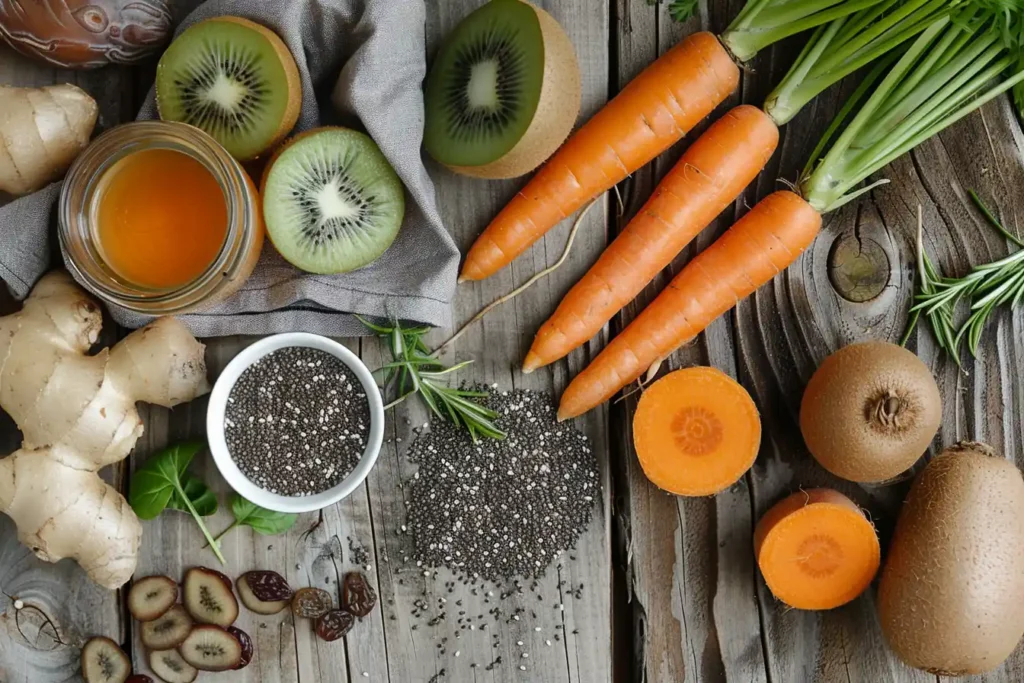Introduction
Carrot juice is often celebrated for its numerous health benefits. Among these, its role as a natural laxative frequently comes into focus. Many claim that drinking carrot juice can support digestion and help alleviate constipation. With its rich profile of nutrients and hydration properties, this vibrant orange drink holds much promise. But is carrot juice truly effective as a natural laxative? This article will explore its digestive benefits, mechanisms, and scientific evidence to help you uncover the truth behind the claim.
In the following sections, we’ll delve deeper into the nutritional power of carrots, examine how carrot juice aids digestion, and weigh in on its purported laxative effects. Let’s find out if this household staple deserves its reputation as a champion for digestive health.
Understanding Carrot Juice: A Nutritional Powerhouse
Carrot juice is packed with essential vitamins and minerals that nourish the body. Rich in vitamin A, beta-carotene, vitamin K, potassium, and antioxidants, it contributes to overall health. These nutrients are crucial not just for good vision and immunity but also for maintaining a healthy digestive system. Fiber, though present in smaller amounts due to juicing, further promotes bowel regularity.
Its antioxidant properties combat inflammation in the gut, which may disrupt digestion. The potassium in carrot juice stabilizes fluids in your digestive system, helping prevent dehydration-related constipation. Adequate hydration, paired with these nutrients, supports the body’s natural detoxification process. Together, they make this juice beneficial for digestion.
Moreover, its mild sweetness and light texture make it easy to consume regularly, even for those with sensitive stomachs. For individuals seeking a healthy addition to their diet, carrot juice can be an excellent option.
Want to make carrot juice at home? Try this easy carrot juice recipe to jumpstart your journey toward better digestive health.

How Carrot Juice Promotes Healthy Digestion
Carrot juice supports digestion in multiple ways. Its hydration properties come first. With a high water content, carrot juice helps soften stools, easing their movement through the intestines. Furthermore, the juice’s trace amounts of natural fibers—despite being juiced—assist in regulating bowel movements.
The potent beta-carotene content enhances gut health by providing anti-inflammatory benefits. Inflammation in the gut can slow down digestion and lead to discomfort, making carrot juice a soothing solution. Its mildly alkaline nature can also help balance stomach acid levels, creating a favorable environment for digestion.
But how does this make carrot juice a natural laxative? When consumed regularly, it acts as a gentle stimulant for the bowel. It promotes peristalsis (the squeezing action of the intestines), which is key for moving waste efficiently. This makes it a mild, natural alternative to over-the-counter laxatives.
Curious about how carrot juice stacks up against other foods for digestion? Learn more about natural laxatives that help digestion.
Is Carrot Juice a Natural Laxative?
So, is carrot juice truly a natural laxative? The answer depends on the individual and how the juice is consumed. Carrot juice contains several properties that aid in alleviating constipation. Its hydration effect, paired with gut-friendly beta-carotene, makes it a valuable addition to a digestion-focused diet.
While carrot juice is not as fiber-rich as eating raw carrots, it remains a gentle and effective laxative for those with mild constipation or irregular bowel movements. It is particularly beneficial for individuals who find traditional fiber supplements or high-fiber foods too harsh on their systems.
However, it’s essential to remember that carrot juice works best as a preventive measure rather than a quick fix. To reap its benefits, drink it regularly alongside a balanced diet. Ultimately, while it cannot replace medications for chronic conditions, carrot juice does fulfill its role as a mild natural laxative for many people looking for natural remedies.
Do you often experience sluggish digestion? Consider incorporating this juice into your routine and observe the results over time. Remember, patience is key with natural solutions!
Scientific Evidence Supporting Carrot Juice as a Laxative
Scientific studies provide valuable insights into the potential of carrot juice to act as a natural laxative. This vibrant juice is rich in fiber and other nutrients that promote bowel regularity. According to research, the soluble fiber in carrots absorbs water, softening stools and making them easier to pass. Additionally, carrots contain natural sugars, such as sorbitol, which may act as an osmotic agent, drawing water into the intestines and aiding elimination.
A study published in the Healthline highlights the role of nutrients like vitamin A and beta-carotene in supporting gut health. These antioxidants may help reduce inflammation in the digestive tract, potentially improving movement through the intestines. Furthermore, the high water content in carrot juice prevents dehydration, a common cause of constipation, and ensures the stool maintains its consistency.
While anecdotal evidence strongly supports its use, further clinical trials are needed to establish its efficacy as a standalone remedy. Even so, incorporating carrot juice into your diet could offer a delicious and healthful way to support regular digestion.

Preparing Carrot Juice for Maximum Digestive Benefits
To maximize the digestive benefits of carrot juice, preparing it correctly is essential. Fresh carrots are the key to creating a nutrient-packed, fiber-rich drink. Before juicing, soak the carrots in water for 20-30 minutes (as detailed here) to retain their moisture and enhance juice extraction.
When selecting carrots, opt for organic to avoid pesticides that can disrupt gut health. Use a high-quality juicer to preserve nutrients like fiber and beta-carotene. Including the carrot pulp in your juice or consuming it separately adds more fiber, amplifying its laxative effects. For a sweeter flavor profile, add apples or honey while avoiding processed sugars that may irritate digestion.
Portion control matters. Drinking 6-8 ounces of carrot juice daily is sufficient to enjoy its health benefits without overloading your digestive system. Additionally, pairing your juice with meals that contain healthy fats, such as nuts or seeds, can improve the absorption of fat-soluble vitamins A, D, E, and K.

Delicious Variations and Recipes Featuring Carrot Juice
Creating a variety of carrot juice recipes keeps your diet exciting while boosting its digestive benefits. Mix and match fruits, vegetables, and spices for natural sweetness and enhanced gut health. Pairing carrots with apples, for instance, adds extra fiber and antioxidants. Selections like orange or ginger can uplift the taste while improving digestive processes.
Here’s a quick recipe to try: Blend one cup of carrots with half an apple, a slice of fresh ginger, and a splash of lemon juice for a refreshing and nutrient-rich drink. If you’re interested in more unique combos, check out these fruits that pair perfectly with carrots for digestible delights.
- Carrot Citrus Delight: Combine carrots with oranges and a hint of mint.
- Carrot Tropical Mix: Blend carrots with mangoes and a pinch of cinnamon.
- Spiced Carrot Medley: Add turmeric and black pepper to your carrot mix for an anti-inflammatory infusion.
It’s important to balance flavor and nutrition. Keep your carrot juice naturally sweetened without processed additives for maximum digestive benefits. These recipes are perfect for both kids and adults, making it easy to embrace a healthier lifestyle.
Additional Health Benefits of Carrot Juice Beyond Laxation
Beyond its role as a natural laxative, carrot juice offers a range of health benefits that are too good to ignore. This wholesome drink is packed with antioxidants like beta-carotene, which the body converts to vitamin A. Vitamin A is essential for healthy vision, skin, and immune function.
Carrot juice is also believed to promote heart health. Its potassium content helps regulate blood pressure by counteracting the effects of sodium. Meanwhile, the antioxidants work to minimize oxidative stress, which can lead to cardiovascular issues. For more insights, explore this detailed guide from Healthline.
Another benefit to highlight is its potential for detoxifying the liver. Carrots contain plant-based compounds that support the elimination of toxins, promoting overall organ health. Not only that, but regular consumption has been linked to improved skin health, thanks to the vitamin C content, which supports collagen production and combats aging signs.
If you’re seeking an energy boost, carrot juice is an excellent pre-workout drink. Its natural sugars provide a sustained energy release, while its rich nutrient profile replenishes electrolytes post-exercise. Clearly, carrot juice is more than just a digestive aid—it’s a versatile superfood that benefits your entire body.
Potential Side Effects of Consuming Carrot Juice
While carrot juice is celebrated for its natural laxative properties, it can also lead to certain side effects when consumed in excess. Moderation is key to reaping its digestive benefits without experiencing adverse reactions.
One potential side effect of drinking too much carrot juice is diarrhea. Because of its high fiber and water content, excessive intake may overstimulate the digestive system. If you’re already experiencing loose stools, limiting your carrot juice consumption may help stabilize your bowel movements.
Another consideration is the risk of carotenemia, a harmless but noticeable condition where your skin turns slightly orange due to excessive beta-carotene. This is most common when large amounts of carrot juice are consumed over an extended period. Transitioning to a balanced diet can help mitigate this issue.
Additionally, individuals with certain underlying conditions, such as irritable bowel syndrome (IBS), may find that the high fiber content of carrot juice triggers bloating or discomfort. Consulting a healthcare provider can help determine the right amount of carrot juice for your unique needs.
If you’re considering adding carrot juice to your diet, remember to start with small quantities. For those looking to experiment with different portion sizes, here’s a simple guideline: limit your intake to a glass (about 8 ounces) per day to avoid any digestive disturbances.
Can carrot juice cause diarrhea? Yes, in some situations, particularly when consumed in large amounts. To balance its benefits and side effects, always listen to your body’s responses after introducing carrot juice into your routine.
Comparing Carrot Juice to Other Natural Laxatives
When stacked against other foods that support digestion, carrot juice holds its own as a standout natural laxative. Its unique combination of fiber, hydration, and essential nutrients makes it an effective option for those seeking a gentle way to relieve constipation.
Other popular natural laxatives include prunes, chia seeds, and kiwi. These alternatives are also fiber-rich, but they may offer additional digestive enzymes or omega-3 fatty acids that cater to different digestive needs. For instance, prunes contain sorbitol, a natural sugar alcohol that provides an even stronger laxative effect, while carrot juice works more subtly.
One advantage of carrot juice is its versatility and gentle action. While foods like chia seeds may require soaking or thorough preparation, carrot juice can be quickly consumed on its own or as part of a smoothie.
If you’re evaluating cost and accessibility, carrots are also widely available year-round. This makes carrot juice a budget-friendly digestive aid compared to pricier options like golden kiwis or exotic flaxseed blends. However, it’s worth experimenting with multiple options to find what works best for your system.

Ultimately, carrot juice is an excellent choice for improving digestion, but pairing it with other natural laxative foods can amplify its overall effects.
Real-Life Experiences: Testimonials and Success Stories
The effectiveness of carrot juice as a natural laxative is not just supported by science but also championed by individuals who have benefited from its gentle digestive properties. Hearing real-life stories provides insight into its practical applications.
Take, for example, Lucy, a working professional who struggled with irregular bowel movements for years. After including an 8-ounce glass of carrot juice daily in her routine, she noticed significant improvements in her digestion within a week. According to Lucy, adding grated ginger and honey to the juice further enhanced its soothing effects.
Another testimonial comes from James, an athlete who frequently experiences dehydration-induced constipation after long workouts. He incorporated carrot juice into his post-workout regimen and appreciated its hydrating properties in addition to its gentle laxative effects. James mentioned blending carrots with oranges for a tangy, refreshing taste.
People have also shared success stories about using carrot juice for children with mild constipation. Small portions (4-6 ounces) have been effective for promoting healthy digestion in young ones without causing drastic changes to their diets.
Such testimonials highlight how carrot juice adapts to individual needs. Whether you’re a busy adult or serving it to a child, it proves to be a simple yet effective remedy. For more user stories, explore our archives here.

Frequently Asked Questions (FAQ)
Curious about carrot juice and its laxative properties? Here, we address some of the most common queries:
- Is carrot juice good for constipation? Yes, carrot juice is a gentle and effective way to support digestion and alleviate mild constipation due to its fiber and hydration properties.
- How does carrot juice help with digestion? The high water and fiber content in carrot juice stimulate peristalsis, promote stool softening, and support a healthier gut environment.
- What are the benefits of drinking carrot juice? Beyond its role as a natural laxative, carrot juice offers benefits like immune system support, improved skin health, and a boost of essential vitamins like A and K.
- Can carrot juice cause diarrhea? In some cases, yes. Overconsumption of carrot juice may overstimulate the digestive system, leading to loose stools.
If you still have questions or concerns, start with small servings of carrot juice and consult your doctor for personalized advice. Its versatility and gentle action make it suitable for most individuals, but listening to your body is crucial.

